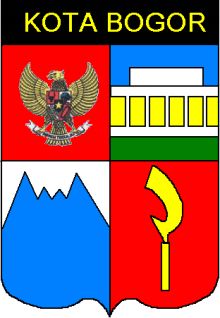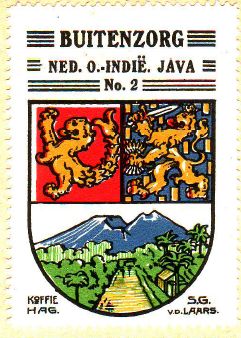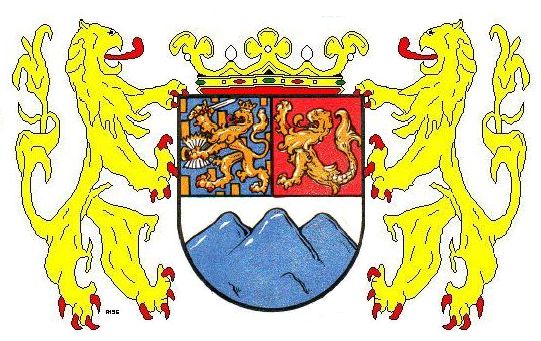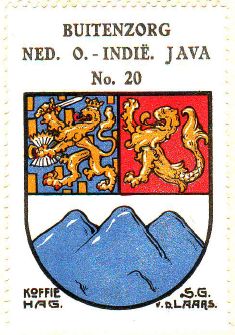Bogor: Difference between revisions
Knorrepoes (talk | contribs) m (Text replacement - "====Official blazon====" to "===Official blazon===") |
Knorrepoes (talk | contribs) m (Text replacement - "====Origin/meaning====" to "===Origin/meaning===") |
||
| Line 8: | Line 8: | ||
===Official blazon=== | ===Official blazon=== | ||
===Origin/meaning=== | |||
I have no information on the origin or meaning of these arms. Any information is welcome. | I have no information on the origin or meaning of these arms. Any information is welcome. | ||
Revision as of 19:10, 22 June 2017
Template:Indonesia BOGOR
Province : Jawa Barat
Official blazon
Origin/meaning
I have no information on the origin or meaning of these arms. Any information is welcome.
Colonial arms
During colonial times the city of Buitenzorg used different arms. In 1921 the local council announced a contest for new arms for the city. A number of proposals were received and discussed in the municipal council.
- The first proposal was by Mr. Bloijs van Treslong, who proposed a crowned shield with the Salak mountain. As supporters two heraldic seal lions. As a motto simply the name Buitenzorg.
- The second proposal by the same person was a quartered shield showing in the frst a heraldic sea lion, in the second the Salak mountain, in the third a stone in Batutulis and in the fourth a lion. The sea lion is from the Van Imhoff arms, the Batutulis stone is a stone with an inscription that refers to the foundation of the Pakoe State. The lion in the fourth quarter is taken from the arms of Governor-gemeral Van Limburg Stirum.
- The tird by Mr. Van der Schraaf with a design showing the sea lion, batutulis stone and a palm tree
- The fourth by Mr. Fuchter, two royal crowns in chief, the sea lion in the center and another crown in base.
The council discussed the proposals and decided on the fourth proposal, in which the lower crown was replaced by the Batutulis stone.
However, on July 30, 1924 the local council adopted the arms as shown below, but with a mural crown, two lion supporters and a banner with the name of the town, basically a version of the second of the four proposals..
| The first arms in the Koffie Hag albums +/- 1930 |
The arms showed in the upper half a heraldic sea-lion, which was taken from the arms of the founder of the local estate, Governor-General Van Imhoff. The upper left quarter showed the Dutch National arms, as the residence of the Dutch Governor-General was located at Buitenzorg (now Bogor). The lower half shows the Salak mountain, which dominates the view from the city.
When the council applied for official registration of the arms, the Dutch Court of Arms made some changes; first the National arms should be in the upper right corner as they were of higher rank than the Van Imhoff arms. Secondly the lower part should be more stylised as it was basically a natural image. Finally the mural crown was not allowed and a normal city crown was added.
These arms were adopted in October 1931. The official blason is :
Doorsneden: I. Gedeeld : rechts : het Rijkswapen, zijnde in azuur, bezaaid met staande blokjes van goud, een leeuw van goud, gekroond met een kroon bam drie bladeren en twee parelpunts van hetzelfde, getongd en genageld van keel, in den rechter voorklauw opgeheven houdende in schuinlinkschen stand een ontbloot Romeinsch zwaard van zilver, met gevest van goud en in den linker een bundel van zeven pijlen tezamen gebonden met een lint van goud; links : in keel een zeeleeuw van goud; II in zilver een driekoppige berg van azuur, oprijzende uit den schildvoet. Het schild gedekt met een gouden kroon van drie bladeren en twee paarlen. Schildhouders: twee leeuwen van goud en genageld van keel.
| The full colonial arms |
The new arms in the Koffie Hag albums +/- 1930 |
Contact and Support
Partners:
Your logo here ?
Contact us
© since 1995, Heraldry of the World, Ralf Hartemink 
Index of the site
Literature : Rühl, 1933; Koffie Hag albums, 1920s and Het Vaderland, 02-10-1937.













